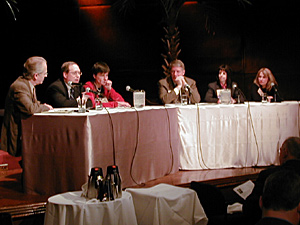|
Audio
Photos
More from MPR
|
February 10, 2005
Gov. Pawlenty and other state officials have said for the last two years that Minnesota is well-positioned to become a leading center of biotechnology. A panel of business, academic and political leaders looked at that question Thursday. Instead of the enthusiasm often heard at such events, they said Minnesota faces challenges that are keeping the state from becoming a biotech leader.
Golden Valley, Minn. — The title of the event was innocuous enough, and fairly typical for this kind of thing -- "Biosciences: Defining Minnesota's Opportunity."
Minnesota's Commissioner of Employment and Economic Development, Matt Kramer, opened the discussion with familiar sentiments -- Minnesota's strengths in agriculture and medical devices, he said, along with activity at the U of M and the Mayo Clinic, make biotech "very hot" right now.
"These combinations -- world-renowned strength, world-renowned research -- put Minnesota in a very strong position," Kramer said. "What you'll hear from the panel is an illumination of those areas where we have the greatest opportunity, and also a very critical analysis of those weaknesses that we must overcome."
In the discussion that followed, panelists laid out challenges that are many and daunting.
Years into Minnesota's biotech push, panelists said the state is still struggling to grab attention and business from established biotech hubs like Boston and Los Angeles. The differential creates a chicken-and-egg problem, for example, when it comes to the biotech workforce.
Bonnie Baskin is the CEO of AppTech, a biotech testing and manufacturing company in St. Paul. The University of Minnesota, she says, turns out plenty of qualified scientists. But without a large biotech industry here, most of them graduate without the on-the-job experience local companies need.
"In companies like ours, in addition to the science, you really have to have some experience and understanding of the industry and the business, and how you apply that science to that industry," Baskin said. "And that is not what we have here, similar to what you would have in the mid-Atlantic corridor or the West Coast."
In this case, one way to grow the industry might be to hire more scientists from elsewhere. Maura Donovan, director of biosciences research and development at Fridley-based Medtronic, was questioned about Medtronic's recent partnership with a Boston biotech company. She says that's often where the talent lies -- and enticing people to move to Minnesota is difficult.
"One of my biggest headaches has always been, and continues to be, recuiting top-notch talent to Medtronic to work in the biotechnology arena," Donovan said.
A number of panelists expressed concern Minnesota is simply being outspent. That feeling was shared by audience member John Dinusson, director of Initiative Ventures, an organization that assists new technology businesses in southern Minnesota. He says the state simply needs to spend more to help the industry.
"They're trying to do it through tax credits. I understand you don't want to give the piggy bank away, but there needs to be some investment. And I think you do need to invest in this area and that's what we haven't done," Dinusson said.
One recent comparison is California, where voters in November decided, despite a huge budget deficit, to spend $3 billion on stem cell research.
On the panel, U of M stem cell pioneer Catherine Verfaillie warned that her institute, the first stem cell institute in the country, could soon be overshadowed.
"They will catch up to Minnesota. Two or three or four years from now, they'll have seven stem cell institutes in California which have a lot more funding toward this kind of research," Verfaillie said.
Verfaillie herself is leaving in 2007 to start a stem cell institute in her native Belgium, though she says she will remain affiliated with the University of Minnesota.
State Sen. Steve Kelley, DFL-Hopkins, criticized Minnesota's venture capital firms for not giving much money to support companies and research inside the state.
From his spot on the panel, Kelley introduced a proposal to use the state Environmental Trust Fund to make investments in biotech companies. He says the fund has about $300 million at its disposal.
After the event, Commissioner Matt Kramer said he was not worried by the blunt tone of the discussion. Kramer acknowledges Minnesota may not become a biotech giant. But he says finding the niches where Minnesota can succeed requires candid talk about the state's strengths -- and its weaknesses.




